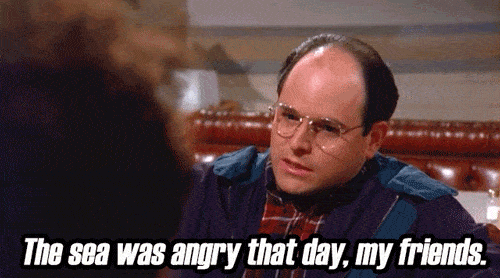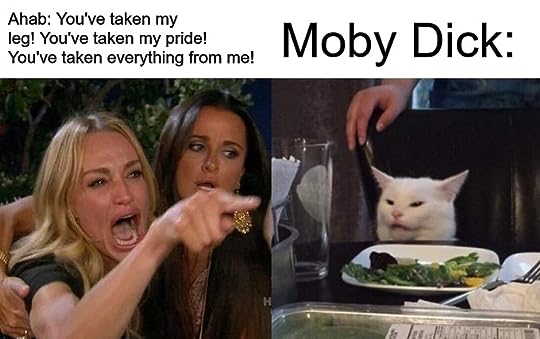What do you think?
Rate this book


720 pages, Hardcover
First published October 18, 1851
You could plainly tell how long each one had been ashore. This young fellow’s healthy cheek is like a sun-toasted pear in hue, and would seem to smell almost as musky; he cannot have been three days landed from his Indian voyage. That man next to him looks a few shades lighter; you might say a touch of satin wood is in him. In the complexion of a third still lingers a tropic yawn, but slightly bleached withal; he doubtless has tarried whole weeks ashore. But who could show a cheek like Queequeg? which, barred with various tints, seemed like the Andes’ western slope, to show forth in one array, contrasting climates, zone by zone.
The Pequod’s whale being decapitated and the body stripped, the head was hoisted against the ship’s side – about half way out of the sea, so that it might yet in great part be buoyed up by its native element. And there with the strained craft steeply leaning over it, by reason of the enormous downward drag from the lower mast-head, and every yard-arm on that side projecting like a crane over the waves; there, that blood-dripping head hung to the Pequod’s waist like the giant Holofernes’s from the girdle of Judith.
The sea had jeeringly kept his finite body up, but drowned the infinite of his soul. Not drowned entirely, though. Rather carried down alive to wondrous depths, where strange shapes of the unwarped primal world glided to and fro before his passive eyes; and the miser-merman, Wisdom, revealed his hoarded heaps; and among the joyous, heartless, ever-juvenile eternities, Pip saw the multitudinous, God-omnipresent, coral insects, that out of the firmament of waters heaved the colossal orbs. He saw God's foot upon the treadle of the loom, and spoke it; and therefore his shipmate's called him mad.




• This book would have been great, admits Anulka, if it weren’t for that darn tootin’ whale interfering with the story.
• The language is too much for Gil Michelini, who believes words have their place (after all we are not heathens!), but they simply do not belong in this novel.
• Marlan’s complaint is that there is too great a lack of story here, so much so that it feels crammed in. It’s like trying to squeeze a cookie into a breadbox.
• Some have experienced extreme aversions to this book. It has made Colleen seasick, quite frankly; it has totally messed up Edwin’s mind; and it has made Robert want to light himself on fire. Even Liz has acknowledged a preference for drowning if such an option existed as a substitute for reading Moby-Dick.
• Tracy Dunning would recommend renting the cartoon version, which far surpasses the actual text in storytelling capability.
• Still others have been befuddled by this novel’s ability to hoodwink its readers into thinking they like it (when in fact they don’t), a bizarre phenomenon Esther Hansen can personally attest to.
• Finally, Keya offers a sobering perspective, which is that people are only reading this book to read it, meaning that if they weren’t reading it, then it would simply be a book not being read. Truly, Yogi Berra couldn’t have put it better himself.
Call me Ishmael. Some years ago – never mind how long precisely – having little or no money in my purse, and nothing particular to interest me on shore, I thought I would sail about a little and see the watery part of the world. It is a way I have of driving off the spleen, and regulating the circulation.
Methinks that in looking at things spiritual, we are too much like oysters observing the sun through the water, and thinking that thick water the thinnest of air.
Captain Ahab stood erect, looking straight out beyond the ship’s ever-pitching prow. There was an infinity of firmest fortitude, a determinate, unsurrenderable wilfulness, in the fixed and fearless, forward dedication of that glance.
“Corkscrew!” cried Ahab, “aye, Queequeg, the harpoons lie all twisted and wrenched in him; aye, Daggoo, his spout is a big one, like a whole shock of wheat, and white as a pile of our Nantucket wool after the great annual sheep-shearing; aye, Tashtego, and he fan-tails like a split jib in a squall. Death and devils! men, it is Moby Dick ye have seen – Moby Dick – Moby Dick!”


Both ends of the line are exposed; the lower end terminating in an eye-splice or loop coming up from the bottom against the side of the tub, and hanging over its edge completely disengaged from everything. This arrangement of the lower end is necessary on two accounts. First: In order to facilitate the fastening to it of an additional line from a neighboring boat, in case the stricken whale should sound so deep as to threaten to carry off the entire line originally attached to the harpoon. In these instances, the whale of course is shifted like a mug of ale, as it were, from the one boat to the other; though the first boat always hovers at hand to assist its consort. Second: This arrangement is indispensible for common safety's sake; for were the lower end of the line in any way attached to the boat, and were the whale then to run the line out to the end almost in a single, smoking minute as he sometimes does, he would not stop there, for the doomed boat would infallibly be dragged down after him into the profundity of the sea; and in that case no town-crier would ever find her again.
Before lowering the boat for the chase, the upper end of the line is taken aft from the tub, and passing round the loggerhead there, is again carried forward the entire length of the boat, resting crosswise upon the loom or handle of every man's oar, so that it jogs against his wrist in rowing; and also passing between the men, as they alternately sit at the opposing gunwales, to the leaded chocks or grooves in the extreme pointed prow of the boat, where a wooden pin or skewer the size of a common quill, prevents it from slipping out. From the chocks it hangs in a slight festoon over the bows, and is then passed inside the boat again; and some ten or twenty fathoms (called box-line) being coiled upon the box in the bows, it continues its way to the gunwale still a little further aft, and is then attached to the short-warp - the rope which is immediately connected with the harpoon; but previous to that connexion, the short-warp goes through sundry mystifications too tedious to detail.



 come to my blog!
come to my blog!






(1) I was in the middle of my "I love Jacques Cousteau!" phase, and this book had a picture of a whale on the cover.

From what I remember, I read this book as a sort of encyclopedia, a bunch of short articles about whaling and whale taxonomy and many ways to skin a whale and occasional interruptions from little bits of what (as I now see it) was the plot. It was confusing and yet informative - like life itself is to nine-year-olds.
(2) It was on the bookshelf juuuuust above my reach, and so obviously it was good because it was clearly meant to be not for little kids¹, and that made my little but bloated ego very happy.¹ So, in retrospect, were War and Peace and Le Père Goriot and The Great Gatsby. In retrospect, there may have been an underlying pattern behind my childhood reading choices.
"Whenever I find myself growing grim about the mouth; whenever it is a damp, drizzly November in my soul; whenever I find myself involuntarily pausing before coffin warehouses, and bringing up the rear of every funeral I meet; and especially whenever my hypos get such an upper hand of me, that it requires a strong moral principle to prevent me from deliberately stepping into the street, and methodically knocking people's hats off - then, I account it high time to get to sea as soon as I can. This is my substitute for pistol and ball. With a philosophical flourish Cato throws himself upon his sword; I quietly take to the ship."Bits like this is what made me stay up at night, pouring over the pages. I could finally see what my nine-year-old past self did not care about (and appropriately so, in the light of literal-mindedness and straightforwardness that children possess) - Melville's constant, persistent comparison of whaling to life itself, using bits and pieces of whaling beliefs and rituals to illuminate the dark nooks and crannies of human souls, to show that deep down inside, regardless of our differences, we all run on the same desires and motives and undercurrents of spirit.
"Human madness is oftentimes a cunning and most feline thing. When you think it fled, it may have but become transfigured into some still subtler form."The elusive White Whale is what we are all chasing, in one form or another, different for all of us, different in how we see it and approach it and deal with it. It's what we all pursue - the difference is how. Melville gives us one of the extremes, the views of a single-minded fanatic, of one who puts everything aside, sacrifices everything (and everyone else) for the sake of a dream, of a desire, of a goal; the person who is capable of leading others unified in his focused, narrow, overwhelmingly alluring vision. We can call Ahab a madman. We can also call him a great leader, a visionary of sorts - had he only used the charisma and the drive and the single-minded obsession to reach a goal less absurd, less suicidal less selfish. Had he with this monomaniac single-mindedness led a crusade for something we think is worthwhile, would we still call him a madman, or would we wordlessly admire his never-altering determination? Isn't the true tragedy here in Ahab focusing his will on destruction and blind revenge, leading those he's responsible for to destruction in the name of folly and pride? Is that where the madness lies?
"...For there is no folly of the beast of the earth which is not infinitely outdone by the madness of men."

"Buoyed up by that coffin, for almost one whole day and night, I floated on a soft and dirgelike main. The unharming sharks, they glided by as if with padlocks on their mouths; the savage sea-hawks sailed with sheathed beaks. On the second day, a sail drew near, nearer, and picked me up at last. It was the devious-cruising Rachel, that in her retracing search after her missing children, only found another orphan."

„Nu s-a relevat pînă acum, din cîte ştiu, o afinitate încă şi mai profundă, cea a lui Ulysse din infern [e vorba de Ulysse în viziunea din Infernul lui Dante, 26: 90-142, n. m.], cu altă căpetenie nefericită, Ahab din Moby-Dick. Primul, ca şi celălalt, îşi atrage propria pierzanie după nenumărate nopţi de veghe şi mult curaj; trama generală este aceeaşi, deznodămîntul este identic, ultimele cuvinte sînt aproape la fel”.